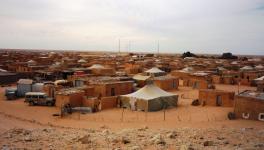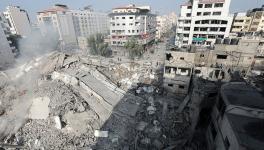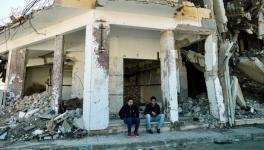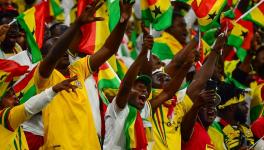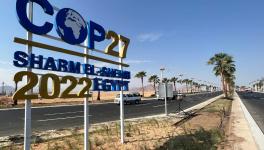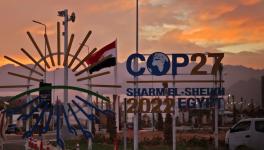The Detritus of Regime Change in Libya
Comment: The doctrine of liberal interventionism has destroyed post-Gaddafi Libya, just as it destroyed post-Saddam Iraq, writes Vijay Prashad.
Four years ago, as NATO prepared to bomb Libya, I asked a senior Western diplomat if he thought the experience of Iraq would inform this adventure.
After all, regime change in Iraq had resulted in chaos - out of which had emerged, in 2006, the Islamic State of Iraq. Regime change produced chaos, which allowed the worst aspects of politics to reveal themselves. The Western diplomat scoffed at my concerns.
Libya would be different, he said.
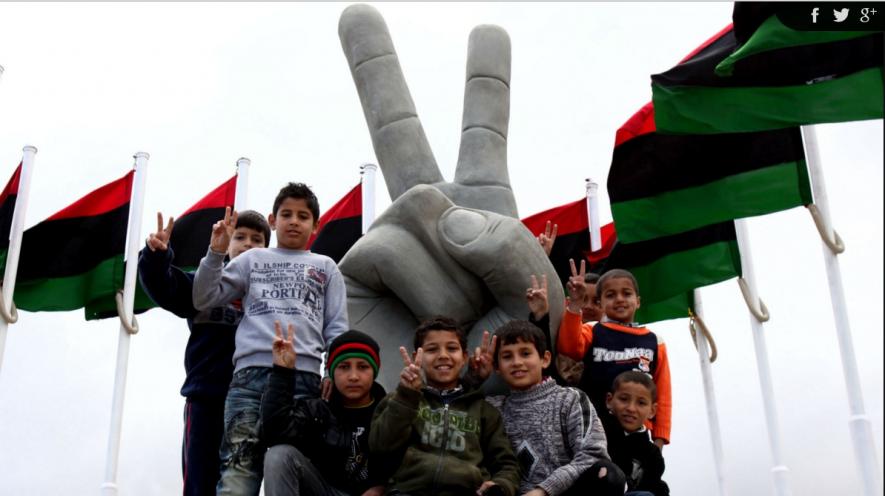
What made Libya exceptional? My friend the diplomat suggested that in Libya everyone hated Muammar Gaddafi. The depth of support for him was weak. Once toppled, the Libyan people would flock to the National Transitional Council, welcoming them to Tripoli with sweets and flowers.
The expectation was that Gaddafi, like Saddam Hussein before him, had limited pockets of support. They were - after all - dictators, and dictators fell as easily as concrete statues of them in the squares of their cities.
My own experience of Libya did not allow me to be so sanguine. There were large sections of Libyan society that relied upon the patronage of the state, and even considerable parts of the population that genuinely liked Gaddafi.
There was no way to test this because there had been neither elections nor polls, nor indeed any other good methodology at work here. It was also true that the Libyan military had barely recovered its morale since its humiliation in the 1987 Chad War.
It would not stand by Gaddafi to the end - antithetical to the experience of the Syrian Arab Army. However weak the support, there were still some pockets of allegiance to Gaddafi.
Would it not have been better to push for peace...? Western diplomats were not keen on peace Would it not have been better to push for peace - sometime in the summer of 2011 - between the already centripetal Libya, being torn apart by town and tribe?
Western diplomats were not keen on peace. They wanted to burnish their doctrine of humanitarian interventionism, which had been tainted by the Iraq experience. Libya was to be its success story.
A fractured Libyan population saw the state institutions destroyed, Gaddafi lynched on the street outside his hometown of Sirte and the various fractions of the rebels take the spoils without concern for the well-being of the nation.
This was a free-for-all. Regional powers pushed forward their own proxies, who then took charge of parts of the country. Oil flowed. Europe smiled. That Libya now has two recognised governments, as well as the Islamic State group, is no surprise. It was written into the way the NATO war functioned.
What happened to that section of Libya that supported Gaddafi? Many went to prison, of course - perhaps more than 10,000 people. Among them were Gaddafi's religious advisor, Khalid Tantoush, and Gaddafi's sons Saif al-Islam and Saadi. Their trial, which began on April 14, 2013, continues with little progress.
Others went into exile. Among those who fled, some disappeared with their skills into mundane lives in Algeria, Tunisia, Egypt and Malta. A few consolidated themselves under the leadership of Gaddafi's close friend and ally, Khuwaildi al-Hamidi, who died this August in Cairo.
Their Libyan Popular National Movement drew in some of the hardened Gaddafi figures, but also slowly reasserted itself inside Libya.
One of Washington's great errors in Iraq was to cashier the country's bureaucracy and army through the vindictive policy named "De-Baathification". One would have thought that that misjudgment would not be repeated in Libya.
Nonetheless, the new government - egged on by the West - passed a Political Isolation Law, which disenfranchised anyone with ties to the Gaddafi establishment.
This threw large numbers of highly skilled Libyans to the wolves. Some had seemed receptive to the Libyan Popular National Movement. Most of these, however, felt terrified to expose themselves. They lived in fear, although with the first glimmer of confidence through their new networks.
It was these networks that emerged a month ago across the country in the first public pro-Gaddafi rallies.
These demonstrations took place in Bani Walid, Benghazi, Sabha, Tobruk, and of course Tripoli.
On the day after the fourth anniversary of the killing of Gaddafi (October 20), chants on the streets of Tripoli included "inshallah ashra Saddam, ashra Muammar" ["May God Send Ten Saddams, Ten Muammars").
In Iraq, parts of the deposed army and some Baath Party members linked up with al-Qaeda in Iraq, and then later the Islamic State of Iraq. It was these motivated and trained men that formed the backbone of the IS advance on Fallujah and Ramadi in 2014.
Much the same story is being repeated with the emergence of IS in Libya. Adversaries of Gaddafi in the 1990s took refuge in the Libyan Islamic Fighting Group; one of whose strongholds was the town of Derna.
These fighters fled the country to join the Jihad International in Afghanistan, Chechnya, Iraq, Yemen and Syria.
It had become a familiar matter to meet an al-Libi in the redoubts of the jihadis. Studies show that Libya provided per capita the highest number of jihadis to this global campaign.
No question that these men returned to Libya in 2011 to the battlefield against their old adversary, and then to shore up their own sectional groups.
The hardened jihadis formed Ansar al-Sharia in Benghazi and Ajdabiya, while others returned to their own Derna-based group, the Shura Council of Islamic Youth.
In 2014, the Shura Council put up the black flag of al-Qaeda, while some of their fighters went off to form the Libyan branch of IS. It is those fighters - including jihadis from their international circuit - that blind-sided the militia of Misrata by taking control of Sirte earlier this year.
Old Gaddafi loyalists, brushed off by history, have dusted off their jackets and their guns to join this IS contingent. They have replicated the connections made by the old Baathist Izzat al-Douri in Ninevah and Anbar with IS.
Was there an alternative to this regime change strategy? When Saddam Hussein was arrested near Tikrit, also his hometown, he reportedly said: "I am Saddam Hussein, president of Iraq, and I want to negotiate."
In both cases, the West and their allies prosecuted a complete victory - which always ends in complete disaster
The US troops humiliated him and threw him in prison, where he was then executed.
That moment was essential - "I want to negotiate". Negotiations are the antidote to regime change.
Saddam Hussein would have brought his Fedayeen Saddam to the table, asking for a truce and a new dispensation to save Iraq from destruction. In 2011, Gaddafi should have been allowed to surrender, and then bring his political bloc to the table.
Instead, in both cases, the West and their allies prosecuted a complete victory - which always ends in complete disaster.
The lesson of Iraq was not learned. It was repeated in Libya. Both countries still hang by a thread. Their people suffer painfully. They have been sacrificed to a theory that is arrogant and erroneous. It deserves a place only in the dustbin of history.
Vijay Prashad is a columnist at Frontline and a senior research fellow at AUB's Issam Fares Institute of Public Policy and International Affairs. His latest book is The Poorer Nations: A Possible History of the Global South (Verso, 2014 paperback).
Follow him on Twitter: @VijayPrashad
Opinions expressed in this article remain those of the author and do not necessarily represent those of Newsclick , its editorial board or staff.
Courtesy: al-Araby al-Jadeed
Get the latest reports & analysis with people's perspective on Protests, movements & deep analytical videos, discussions of the current affairs in your Telegram app. Subscribe to NewsClick's Telegram channel & get Real-Time updates on stories, as they get published on our website.










